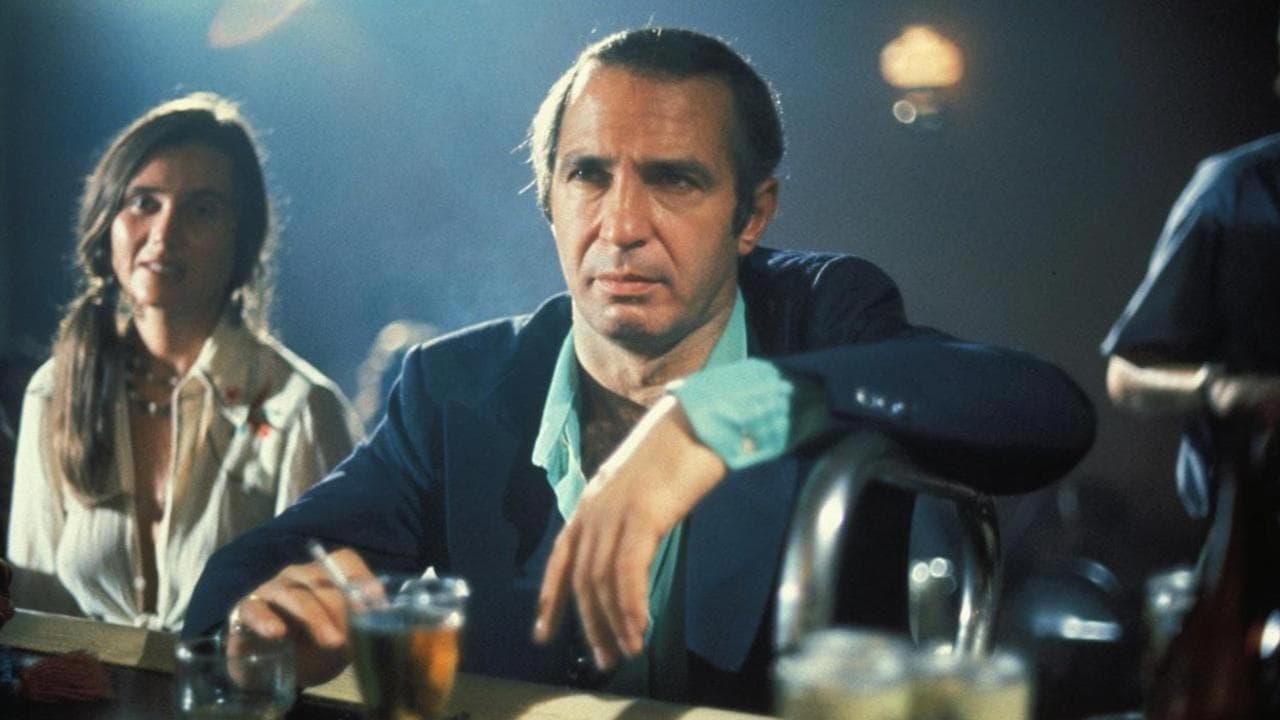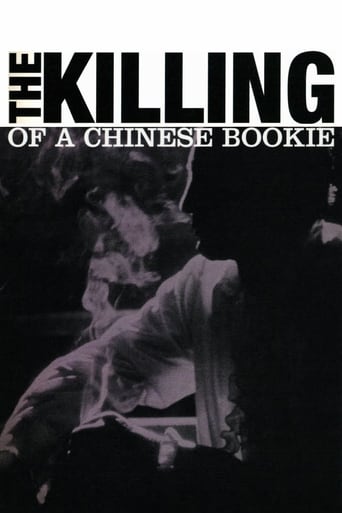Dynamixor
The performances transcend the film's tropes, grounding it in characters that feel more complete than this subgenre often produces.
Kaydan Christian
A terrific literary drama and character piece that shows how the process of creating art can be seen differently by those doing it and those looking at it from the outside.
Matylda Swan
It is a whirlwind of delight --- attractive actors, stunning couture, spectacular sets and outrageous parties.
Marva
It is an exhilarating, distressing, funny and profound film, with one of the more memorable film scores in years,
Steve Pulaski
NOTE: This film was recommended to me by John Henry Westhead for "Steve Pulaski Sees It," and the following review is a review of the 108 minute cut of the film instead of the 135 minute cut.The opening shot of John Cassavetes' The Killing of a Chinese Bookie lingers on Cosmo Vittelli (Ben Gazzara) as he leans against a wall that has a painted mural of a scantily clad woman, a fitting metaphor for the film that follows. Through subtle yet clear, distinct photography, Cassavetes shows that nudity and sexuality are the backbone for Vittelli and his business, a local nightclub. Without the reliance on being provocative and the presence of arousal, Vittelli's dime-a-dozen nightclub is nothing. This would all seem so obvious and self-explanatory if Vitelli wasn't so opposed to thinking that the half-naked dancers are the reason the house is jammed on a Friday or Saturday night.The film revolves around Cosmo's descent into dirty business with a sleazy loanshark (played by the film's producer Al Ruban) to pay off longstanding gambling debts, a recurring habit of Cosmo's in conjunction with running his club. Vitelli, who is always one to make deals that benefit both parties, decides to allow his loanshark and his friends to have one great night at the club, all expenses paid, even going as far as to allow them to gamble for free. With this, Vitelli has ostensibly paid off all of his debts, so to celebrate, he begins gambling again, eventually ending the night $23,000 in the hole and right back to the same place he freed himself from moments ago.The Killing of a Chinese Bookie shows the cyclical drudgery of gambling addiction; what begins as a casual, and even carefree, bout of seeing high highs and low lows turns into a vicious, compromising addiction that too often results in the gambler discovering his worst victim/enemy is himself. Vitelli loves his nightclub, but he loves the simultaneous thrill and laidback qualities of gambling even more to repeatedly put himself and his business in jeopardy.Vitelli is also delusional about his nightclub, not in the sense that his finances are in the best possible standing, but that people come to see the talent of the exotic dancers and not just their bodies. Vitelli and his team have the ladies put on elaborate shows with decorative set designs and costumes, and despite his team telling him otherwise, Vitelli believe it's the stories and the costumes that bring people in above anything else. Deep down, one wonders if he can regretfully admit that's not the case, but even so, that doesn't stop him from stringing together elaborate sets in the meantime.Ben Gazzara gives a strong, subtle performance as Vitelli. His character is often quiet, reserved, and even occasionally passive as he allows his actions to rightfully damn himself instead of fighting them, and Gazzara communicates the traits largely through facial expressions and his ability to convey power through his stature and presence. Vitelli is your typical club owner rather than your average bar owner in that he's quiet and he listens; he studies things around him, as we can tell when he's intently observing the activities at his poker table. These are all very low-key, conservative traits that Gazzara needs to embody to prevent his character from becoming too bombastic or too impressionistic and he nails the challenge beautifully.Encompassing Gazzara's performance is Cassavetes' and cinematographers Ruban and Mitchell Breit, who help detail the environment of this local nightclub. Cassavetes directs the shows with a lovely emphasis on essence and environment, showcasing the anomaly of such a medium-budget production being put on centerstage for a rather seedy nightclub. Actresses Alice Friedland and Azizi Johari, playing dancers decorated from top to bottom in fancy decor, are the stars of these lengthy scenes that do nothing but linger, like smoke expelling off of a cigarette. The result has the ability to put the most seasoned moviegoer (or Cassavetes fan, for that matter) into a deep-seated trance of admiration.The Killing of a Chinese Bookie is a nicely told story of disillusionment and delusion, two of the heaviest and most mentally taxing emotions a human being can bear alongside depression and stress. Embodying such lofty emotions is Gazzara at the center of a film that moves gracefully and liberally at just under a hundred and ten minutes, and encapsulating the film are lovely set designs that compliment the film's motions and interworkings. If only the film wasn't so disproportionately focused on Vitelli, even when nothing truly significant is occurring with his character, and we got more insight into the lives of his dancers could this be an all-encompassing long at a nightclub and not just the central part of it.Starring: Ben Gazzara, Al Ruban, Timothy Agoglia Carey, Seymour Cassel, Alice Friedland, and Azizi Johari. Directed by: John Cassavetes.
gavin6942
A proud strip club owner (Ben Gazzara) is forced to come to terms with himself as a man, when his gambling addiction gets him in hot water with the mob, who offer him only one alternative.Gazzara has made a career of playing seedy characters. Although he regularly worked with Cassavetes, younger audiences might know him best from "Roadhouse" or "The Big Lebowski". They would not be disappointed by his portrayal here. Cassavetes regulars Al Ruban and Seymour Cassel also appear, though Gena Rowlands is noticeably absent.Cassavetes' best work is widely regarded to be either "Faces" or "A Woman Under the Influence", but a case could be made for this one, as well. His earlier work relied heavily on improvisation, and some might argue they suffered from too much "small talk" adding minutes to the running time. Here the plot is much more linear, much tighter to a script. As Larry Karaszewski has noted, it is much more "high concept" than his earlier work.Phillip Lopate wrote, "The plot's biggest gamble is to make Cosmo, this likable if screwed-up schnook, actually go through with the killing. Is it plausible that someone so seemingly decent would do such a thing?" But, of course, this is the whole point... when you must choose between killing for the mob or being killed by the mob, your actions may no longer be decided by whether you are a "decent" person.The 1978 re-cut of the film is even tighter, removing much of the unnecessary night club footage, which is unusual (considering most director's cuts are longer than the theatrical releases). In some ways, it is a different film, and making comparisons between the two is a review in itself.
eugaer
On this 50th anniversary I remain surprised that no one has commented that "The Killing of a" must have been inspired by Jack Ruby's enigmatic role in the Dallas tragedy. The similarity between Ruby's club and Cosmo's is obvious. More to the point: Cosmo is sent out to attack a heavily armed target. The only purpose is to get him killed by the bookie's bodyguards. (Late in the film Cosmo says "I see I was set up.") As it turns out, he skillfully and unexpectedly completes his mission impossible. In the same way Ruby was able to approach and shoot the person who should have been the most closely watched and carefully guarded prisoner in the country. But somehow he got through. Maybe someone he had crossed wanted him to fail. I'm not saying that Cassavetes was seriously interested in explaining what happened in 1963 -- only that he saw it as an intriguing plot possibility.
chaos-rampant
One of the most stimulating relaxations I know is simply floating on water. The good thing in living a short walk from the beach is that I get to do this every other day of nearly half the year. It's great at dusk, whereby the sea is not some abstract volume but the specific sensation of upfloat, and the early moon is that rock over there from me. Tangible moments of world, encompassing what the Chinese call the tao.No film even compares to the feeling, certainly no piffle Koyannisqatsi. But a few filmmakers come close to this totality as something felt. Cinema is nothing in a large sense, that is until a certain point where it becomes a most powerful tool for enlightenment. Cassavetes is one of those guys, and knows just how to use it.So I revisited this after many years as part of my Cassavetes series, this time watching the extended version. The shorter one may be tighter, more focused, but I'll always opt for a longer stay in his world.The film is the perfect summer night movie, one to watch with the distant sound of motor noise flowing through open windows. Cassavetes loves the night, the neon signs, the sound of traffic, the hubbub of the nightclub, the brushing of people in close spaces. The film is full of extremely memorable spaces, years later I could recall Cosmo standing in the entrance of his club, the backalley where he's beaten up, the empty highway, the phonebooth in the middle of nowhere, running from the Chinaman's house.Here, Cassavetes stretches two things. The existential noir where desire, not even so much for poker money, the desire it seems to look comfortable in front of people, summons the noir darkness. Usually in a noir, from that point we get some hallucinative fooling with the narration, here completely merged with the flow of things. The murky proposal for the kill in the cramped car, nothing telegraphed. The subtle menace and helplessness around the gangsters. The foreshadowing bang of the flat tire. The inescapable framing where he was the stooge of fate all along.And a more gentle self-reference, where Cosmo, standing for Cassavetes, gambles with money-people and loses. These mafia executives want from him a straightforward movie that ends with a killing, the simplest stuff, which he grudgingly delivers. The starkest contrast from the fancy, lively improvisation going on in his club, that both reflects and ribs at Cassavetes' own stuff. He does it his way of course, with fumbling, confusion and uncertainty. And still succeeds. Only The Long Goodbye rivals it in the crime sweepstakes of the 70s, no doubt inspired by this.Here, because of the adoption of genre with its clear horizon, the tethers are easier than previous Cassavetes films. Oh there is the anxiety, but that is part and parcel of the greater life. More than any of his films though, it achieves that sublime floating sense that encompasses a concrete totality. His camera excites me like no one else's. Antonioni adopts the transcendent position. Tarkovsky the one of flowing mind. Cassavetes adopts the position of tentative coming-into-being, his visual space has a thick and viscous quality, it has time, it has a tangible and floating gravity, all things coming to be and vanishing again in a cosmic vitality.Cosmo, a man of cosmic vitality. All through the gangster stuff, Cosmo keeps worrying about the show and the club. Because the show and the atmosphere around his club are of the soul of this man, the images and living space worth living for—dreamy and spontaneous, scented air, a little sloppy because it is re-discovered each night. But that is as much a role, the entrepreneur, as that of the killer, the gambler, the suave playboy, masks for the night. Not the original face. Deep down I get the sense of a weary joy that runs deeper than happiness, a mono no aware.Something to meditate upon.

